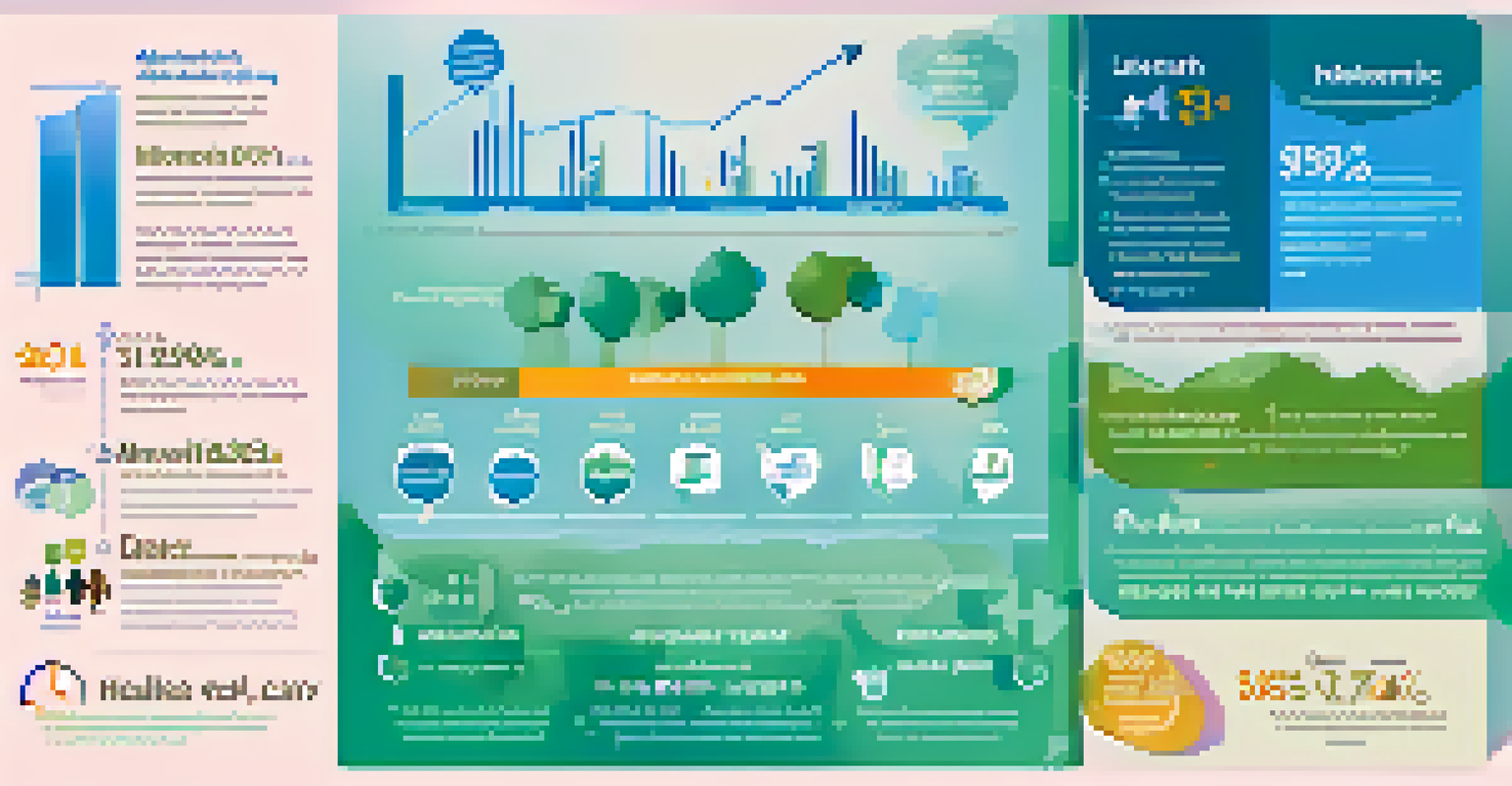Addiction Treatment: A Cost-Effective Economic Investment

Understanding the Economic Burden of Addiction
Addiction is not just a personal struggle; it carries a hefty economic burden on society. The costs associated with addiction can include healthcare expenses, lost productivity, and increased crime rates. For example, the National Institute on Drug Abuse estimates that substance abuse costs the U.S. economy more than $740 billion annually. By addressing addiction, we can alleviate these financial strains and improve community well-being.
Addiction is a disease, not a moral failing. It requires treatment, not punishment.
Additionally, the costs of untreated addiction can ripple through families and communities, leading to increased poverty and instability. When individuals struggle with addiction, they often find it difficult to maintain employment, which can lead to unemployment and homelessness. This creates a cycle of hardship that can be challenging to escape, further perpetuating economic issues in society.
In contrast, investing in effective addiction treatment can lead to significant savings in various sectors. By reducing healthcare costs, crime-related expenses, and lost productivity, society stands to benefit economically. In essence, treating addiction isn't just a compassionate choice; it's a strategic economic decision that can yield long-term benefits.
The Return on Investment in Treatment Programs
Investing in addiction treatment programs often yields impressive returns. Numerous studies indicate that for every dollar spent on treatment, society can save several dollars in future costs related to healthcare, criminal justice, and lost productivity. For instance, the Substance Abuse and Mental Health Services Administration (SAMHSA) highlights that comprehensive treatment programs can return up to $12 for every dollar invested.

Moreover, when individuals receive proper treatment, they are more likely to regain their footing in the workforce. This not only enhances their personal financial stability but also contributes to the economy as a whole. A stable job means increased tax revenue and reduced reliance on social services, creating a positive feedback loop.
Addiction's Economic Impact
Addiction imposes significant costs on society, with estimates exceeding $740 billion annually due to healthcare, lost productivity, and crime.
Ultimately, the financial benefits of addiction treatment extend beyond immediate savings. They foster healthier communities, lower crime rates, and promote overall economic growth. By recognizing addiction treatment as an investment rather than an expense, we can shift the narrative and prioritize funding for these essential programs.
The Social Benefits of Addiction Treatment Investments
Beyond economic metrics, addiction treatment also offers profound social benefits. When individuals receive treatment, they often experience improved mental health, better relationships, and enhanced quality of life. This transformation not only affects the individual but also has a ripple effect on families and communities.
The greatest tragedy is not that addiction exists, but that there are so many who suffer in silence and do not seek help.
For instance, a person in recovery may reunite with their family, rebuild relationships, and contribute positively to their community. This social reintegration can lead to stronger, more resilient communities where individuals support one another rather than being marginalized by addiction. It's a win-win situation that enriches the social fabric of society.
Furthermore, when communities prioritize addiction treatment, they foster an environment of support and understanding. This can lead to reduced stigma around addiction, encouraging more individuals to seek help without fear of judgment. By championing treatment, we can cultivate a culture of compassion that ultimately benefits everyone.
Barriers to Accessing Addiction Treatment
Despite the clear benefits of addiction treatment, many individuals face barriers to accessing these essential services. Factors such as cost, lack of insurance coverage, and geographical limitations can make it difficult for those in need to receive the help they require. This gap in access can perpetuate the cycle of addiction and its associated economic burdens.
Additionally, stigma around addiction often prevents individuals from seeking treatment. Many people worry about the judgment they might face from friends, family, or employers, which can deter them from taking that crucial first step towards recovery. Addressing these social stigmas is vital in opening up pathways to treatment.
Investing in Treatment Pays Off
For every dollar spent on addiction treatment, society can save up to $12 in future costs related to healthcare and criminal justice.
To overcome these barriers, it is essential to advocate for policies that expand access to treatment. This could include increasing funding for public treatment programs, expanding insurance coverage, and raising awareness about the importance of seeking help. By removing obstacles, we can ensure that more individuals have the opportunity to receive the support they need.
Innovative Approaches to Addiction Treatment
As the landscape of addiction treatment evolves, innovative approaches are emerging that enhance effectiveness and accessibility. For example, telehealth services have gained popularity, allowing individuals to receive counseling and support from the comfort of their homes. This can be particularly beneficial for those living in remote areas or facing mobility challenges.
Another promising approach is the integration of technology in treatment programs, such as mobile apps that provide support and resources for individuals in recovery. These tools can empower users to track their progress, connect with peers, and access vital information, making treatment more interactive and engaging.
By embracing innovative methods, we can adapt to the changing needs of individuals seeking help. These advancements not only improve access to treatment but can also enhance the overall effectiveness of programs, ensuring that more people achieve lasting recovery.
The Role of Community in Supporting Recovery
Community support plays a crucial role in successful addiction recovery. When individuals feel connected to their community, they are more likely to stay engaged in treatment and maintain their sobriety. This highlights the importance of creating supportive networks that foster a sense of belonging and understanding.
Local organizations, support groups, and recovery events can provide invaluable resources for individuals in recovery. These initiatives not only offer emotional support but also help individuals develop new friendships and social connections that can replace the negative influences of their past. It's about building a new foundation for a healthier life.
Community Support is Vital
Strong community networks enhance recovery success by providing emotional support and fostering a sense of belonging for individuals overcoming addiction.
Moreover, when communities come together to support recovery, it paves the way for broader societal change. By promoting awareness and understanding around addiction, communities can break down barriers and encourage more individuals to seek help. This collective effort transforms the narrative surrounding addiction and fosters an environment where recovery is celebrated.
Policy Recommendations for Effective Investment in Treatment
To maximize the economic benefits of addiction treatment, policymakers must prioritize funding and resources for these programs. This includes increasing financial support for comprehensive treatment facilities and ensuring that they are accessible to all individuals, regardless of their socioeconomic status. By investing in treatment, we can create a healthier society and reduce the overall costs of addiction.
Additionally, implementing policies that promote mental health awareness and destigmatize addiction is vital. Education campaigns can help shift public perception and encourage more individuals to seek help without fear of judgment. This cultural change is essential for fostering a supportive environment that prioritizes recovery.

Finally, collaboration between government, healthcare providers, and community organizations is key to developing effective treatment strategies. By working together, we can create a robust support system that addresses the complex needs of individuals struggling with addiction. This coordinated approach will not only improve treatment outcomes but also maximize the economic benefits for society as a whole.